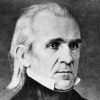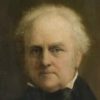Nay, we have heard it said that there is not a quaker or a baptist, a presbyterian or an episcopalian, a catholic or a protestant in heaven: that, on entering that gate, we leave those badges of schism behind, and find ourselves united in those principles only in which god has united us all. Let us not be uneasy then about the different roads we may pursue, as believing them the shortest, to that our last abode: but, following the guidance of a good conscience, let us be happy in the hope that, by these different paths, we shall all meet in the end. and that you and I may there meet and embrace is my earnest prayer: and with this assurance I salute you with brotherly esteem and respect.
Thomas Jefferson (1743-1826) American political philosopher, polymath, statesman, US President (1801-09)
Letter (1814-09-26) to Miles King
(Source)
Where he had "heard it said" might be an 1813 letter from John Adams.
Quotations about:
denomination
Note not all quotations have been tagged, so Search may find additional quotes on this topic.
I told him that, thank God, under our constitution there was no connection between Church and State, and that in my action as President of the U.S. I recognized no distinction of creeds in my appointments to office.
James K. Polk (1795-1849) American lawyer, politician, US President (1845-1849)
Diary (1846-10-14 )
(Source)
Every sect is a moral check on its neighbour. Competition is as wholesome in religion as in commerce.
Walter Savage Landor (1775–1864) English writer and poet
Imaginary Conversations, “Dialogues of Literary Men,” ch. 29 “Martin and Jack” (1824-29)
(Source)
A love of order, seemliness, and good taste has led the Anglican Church along a middle path between what a seventeenth-century divine called “the meretricious gaudiness of the Church of Rome and the squalid sluttery of fanatic conventicles.”
William Ralph Inge (1860-1954) English prelate [Dean Inge]
“Bishop Gore and the Church of England” (1908), Outspoken Essays, First Series (1919)
(Source)
The reference is to "S. P. of Cambridge," believed to be the later Bishop Simon Patrick, who published in 1662 the pamphlet "A Brief Account of the new Sect of Latitude-men," lauding "that virtuous mediocrity which our Church observes between" the alternatives quoted by Inge. Reprinted in John Dunton, The Phenix, Vol. 2, ch. 4 (1707).
If I know your sect, I anticipate your argument.
Ralph Waldo Emerson (1803-1882) American essayist, lecturer, poet
“Self-Reliance,” Essays: First Series (1841)
(Source)
“Even if some details of dogma aren’t true — or even all of ’em — think what a consolation religion and the church are to weak humanity!”
“Are they? I wonder! Don’t cheerful agnostics, who know they are going to die dead, worry much less than good Baptists, who worry lest their sons and cousins and sweethearts fail to get into the Baptist heaven — or what is even worse, who wonder if they may not have guessed wrong — if God may not be a Catholic, maybe, or a Mormon or Seventh-day Adventist instead of a Baptist, and then they’ll go to hell themselves. Consolation? No!”
Every religion consists of moral precepts, & of dogmas. In the first they all agree. All forbid us to murder, steal, plunder, bear false witness Etc. and these are the articles necessary for the preservation of order, justice, & happiness in society. In their particular dogmas all differ; no two professing the same. These respect vestments, ceremonies, physical opinions, & metaphysical speculations, totally unconnected with morality, & unimportant to the legitimate objects of society. Yet these are the questions on which have hung the bitter schisms of Nazarenes, Socinians, Arians, Athanasians in former times, & now of Trinitarians, Unitarians, Catholics, Lutherans, Calvinists, Methodists, Baptists, Quakers Etc. Among the Mahometans we are told that thousands fell victims to the dispute whether the first or second toe of Mahomet was longest; & what blood, how many human lives have the words ‘this do in remembrance of me’ cost the Christian world!
We all agree in the obligation of the moral precepts of Jesus: but we schismatize & lose ourselves in subtleties about his nature, his conception maculate or immaculate, whether he was a god or not a god, whether his votaries are to be initiated by simple aspersion, by immersion, or without water; whether his priests must be robed in white, in black, or not robed at all; whether we are to use our own reason, or the reason of others, in the opinions we form, or as to the evidence we are to believe. It is on questions of this, & still less importance, that such oceans of human blood have been spilt, & whole regions of the earth have been desolated by wars & persecutions, in which human ingenuity has been exhausted in inventing new tortures for their brethren.
It is time then to become sensible how insoluble these questions are by minds like ours, how unimportant, & how mischievous; & to consign them to the sleep of death, never to be awakened from it. The varieties in the structure & action of the human mind, as in those of the body, are the work of our creator, against which it cannot be a religious duty to erect the standard of uniformity.
Thomas Jefferson (1743-1826) American political philosopher, polymath, statesman, US President (1801-09)
Letter (1809-09-27) to James Fishback [draft]
(Source)
Jefferson seriously dialed back his actual response, though he kept both in his files; the final letter read, in this passage:The interests of society require the observation of those moral precepts only in which all religions agree, (for all forbid us to murder, steal, plunder, or bear false witness.) and that we should not intermeddle with the particular dogmas in which all religions differ, and which are totally unconnected with morality. in all of them we see good men, & as many in one as another. The varieties in the structure & action of the human mind as in those of the body, are the work of our creator, against which it cannot be a religious duty to erect the standard of uniformity.
In this country the Episcopalians have done some good, and I want to thank that church. Having on an average less religion than the others — on an average you have done more good to mankind. You preserved some of the humanities. You did not hate music; you did not absolutely despise painting, and you did not altogether abhor architecture, and you finally admitted that it was no worse to keep time with your feet than with your hands. And some went so far as to say that people could play cards, and that God would overlook it, or would look the other way. For all these things accept my thanks.
Robert Green Ingersoll (1833-1899) American lawyer, freethinker, orator
“What Must We Do to Be Saved?” Sec. 7 (1880)
(Source)
You say you’re supposed to be nice to the Episcopalians and the Presbyterians and the Methodists and this, that, and the other thing. Nonsense, I don’t have to be nice to the spirit of the Antichrist.
Pat Robertson (1930-2023) American politician and televangelist
The 700 Club broadcast (1991-01-14)
(Source)
The earliest documentation of this quote I can find is in David Cantor, The Religious Right: The Assault on Tolerance & Pluralism in America, Sec. 1, ch. 1 (1994).
Men and women have been burned for thinking there is but one God; that there was none; that the Holy Ghost is younger than God; that God was somewhat older than his son; for insisting that good works will save a man without faith; that faith will do without good works; for declaring that a sweet babe will not be burned eternally, because its parents failed to have its head wet by a priest; for speaking of God as though he had a nose; for denying that Christ was his own father; for contending that three persons, rightly added together, make more than one; for believing in purgatory; for denying the reality of hell; for pretending that priests can forgive sins; for preaching that God is an essence; for denying that witches rode through the air on sticks; for doubting the total depravity of the human heart; for laughing at irresistible grace, predestination and particular redemption; for denying that good bread could be made of the body of a dead man; for pretending that the pope was not managing this world for God, and in the place of God; for disputing the efficacy of a vicarious atonement; for thinking the Virgin Mary was born like other people; for thinking that a man’s rib was hardly sufficient to make a good-sized woman; for denying that God used his finger for a pen; for asserting that prayers are not answered, that diseases are not sent to punish unbelief; for denying the authority of the Bible; for having a Bible in their possession; for attending mass, and for refusing to attend; for wearing a surplice; for carrying a cross, and for refusing; for being a Catholic, and for being a Protestant; for being an Episcopalian, a Presbyterian, a Baptist, and for being a Quaker. In short, every virtue has been a crime, and every crime a virtue. The church has burned honesty and rewarded hypocrisy. And all this, because it was commanded by a book.
Robert Green Ingersoll (1833-1899) American lawyer, freethinker, orator
Lecture (1874-05-03), “Heretics and Heresies,” Free Religious Society, Kingsbury Hall, Chicago
(Source)
Collected in The Gods and Other Lectures (1876).
For while this year it may be a Catholic against whom the finger of suspicion is pointed, in other years it has been, and may someday be again, a Jew — or a Quaker — or a Unitarian — or a Baptist. It was Virginia’s harassment of Baptist preachers, for example, that helped lead to Jefferson’s statute of religious freedom. Today I may be the victim — but tomorrow it may be you — until the whole fabric of our harmonious society is ripped at a time of great national peril.
John F. Kennedy (1917-1963) American politician, author, journalist, US President (1961–63)
Speech, Greater Houston Ministerial Association (12 Sep 1960)
(Source)










